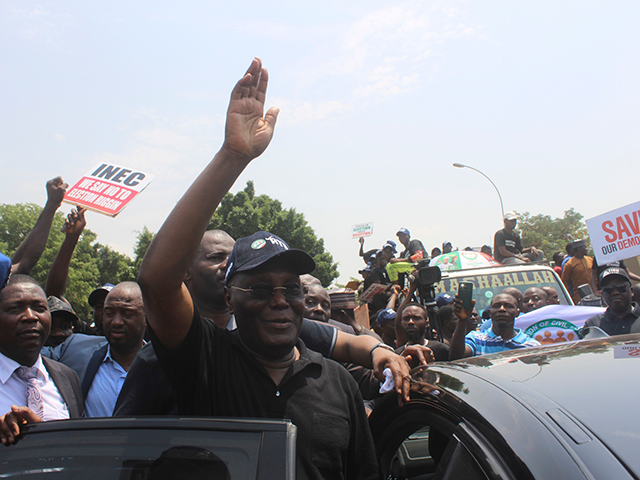Nigerian presidential candidate Atiku Abubakar of the People’s Democratic Party (PDP) led a march on the Independent National Electoral Commission (INEC) on Monday to announce that he believes he is the true winner of the February 25 election. Third-party candidate Peter Obi likewise claimed that he was the true winner last week.
According to the INEC’s vote tallies, the winner was Bola Tinubu of the incumbent All Progressives Congress (APC) party. After four days of counting, the INEC announced last Wednesday that Tinubu won with 29 percent of the vote, followed by Abubakar with 25 percent and Obi with 25 percent. Obi, a former member of PDP running as an outsider and reformer under the banner of the tiny Labor Party, was favored to win in many pre-election polls.
Hundreds of chanting PDP supporters surrounded INEC headquarters in the city of Maitama on Monday, led by Abubakar and his campaign chief, Sokoto State Governor Aminu Tambuwal.
“This is the worst conducted election in our democratic history,” Abubakar media adviser Paul Ibe said at the rally. Nigeria has been democratic since 1999.
“There were a lot of expectations. Nigerians were looking for a leader that will bring them together and begin the process of recovery. What we have is actually a robbery,” Ibe said.
Police held the protesters back from the INEC building until some election officials emerged to address the crowd.
“We have evidence that we won this election by our own collation but what we’re saying, what we’re demanding, is that as at this moment, Mahmood Yakubu has not done a review of that collation; he should review the collation. That’s our demand,” declared Kola Ologbondiyan, spokesperson for Abubakar’s presidential campaign.
Mahmood Yakubu, chairman of the INEC, made the formal announcement of Tinubu’s victory last Wednesday. Yakubu has thus far been unwilling to entertain challenges to the presidential count, but he has admitted the election system did not work as smoothly as planne, and promised improvements for the gubernatorial elections next week.
Last Friday, six Nigerian states – all governed by members of Abubakar’s PDP party – asked the Supreme Court to void the result of the election. The court challenge said INEC failed to follow election laws and its own rules during the vote and did not keep a promise to post the results from 176,000 polling units across the country to the INEC’s web portal.
The six states suddenly withdrew their court challenge later on Friday, without saying why. Nigerian courtwatchers noted the Supreme Court has never overturned an election before, but the dropped challenge seemed unique because the case that INEC jeopardized the integrity of the entire process by failing to post the results on its portal was quite strong.
Obi and Abubakar have until March 31 to file their petitions with the appeals court tribunal in Nigeria’s capital of Abuja. The tribunal will then have 180 days to pronounce its decision, and if either petitioner appeals to the Supreme Court, it could be another 60 days before the final outcome of the challenges is known. There is very little chance that even the most swiftly-filed appeal could prevent Tinubu from being sworn in as president on May 29.
Obi’s Labor Party is crowdsourcing a comparison of paper ballots and digital election results with its tech-savvy young supporters. The Labor effort already claims to have discovered some discrepancies, as well as inaccurate data posted on INEC’s website.
On Sunday, U.S. Ambassador to Nigeria Mary Beth Leonard said “the electoral process as a whole on February 25 failed to meet Nigerians’ expectations,” but stopped short of calling for the result to be overturned. Instead, she called for calm while Abubakar and Obi press their challenges in court, and urged the INEC to learn from its mistakes before the March 11 elections for governors.
“In the coming days, it will be important for the future of this country that Nigerians not let their differences divide them, and that the legally established process for resolving challenges to the election be allowed to take its course,” Leonard said.
“The United States is no stranger to election-related controversy and conflict. As much as it can be unsatisfying to end an electoral process in a courtroom, in a constitutional democracy bound by the rule of law, that is where electoral conflicts may appropriately conclude,” she said.

COMMENTS
Please let us know if you're having issues with commenting.